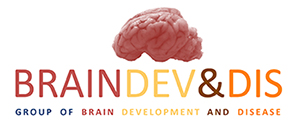Research output per year
Research output per year
PhD with First Class Honours, Monash University, Melbourne, Australia
Research activity per year

Using STEM CELLs to model the Brain’s Role in Aging and Involvement in Neurodegeneration
Current Research Interests:
Techniques we perform in the lab
Current funding sources:
We are particularly interested in the role of the entorhinal cortex in Alzheimer’s disease and why it is one of the first regions of the brain that is affected by the disease. In this project, we have performed detailed investigation of the anatomical and molecular make-up of the entorhinal cortex using the developing pig brain and are using state-of-the-art single-cell RNA sequencing technology to discover more details on the stellate cell located in the entorhinal cortex and its role in the disease. The aim is to produce a stellate cell in the dish from human induced pluripotent stem cells and study why it is particularly susceptible in Alzheimer’s disease.
The research is currently in preprint form: https://www.biorxiv.org/content/10.1101/738443v1
Funded by Innovation Foundation (Brainstem) and The Danish Council for Independent Research: Technology and Production
Previously funded Research Project 2010-2014:
Generation of induced pluripotent stem cells from the APPsw biomedical pig.
Objective of the Project:
The major objective was to produce porcine neural stem cells from wildtype and APPsw transgenic pigs and differentiate these into neurons. The APPsw pig, was produced by Aarhus University and carries a human mutant gene which leads to a juvenile onset of Alzheimer’s disease in humans. The wildtype iPSC-derived neural cells could be used for future transplantations into the Alzheimer’s pig brain and neural cells derived from Alzheimer biomedical pig will be studied in-vitro to investigate the etiology of the disease.
Official Title:
Porcine induced pluripotent stem cells – Generation of in-vitro models and therapeutic neurons for the Alzheimer’s biomedical pig.
Funded by:
Det Frie Forskningsråd: Teknologi og Produktion
The Danish Research Council for Technology and Production Sciences
Fund Total:
3,347,880 DKK
Lecturer in Cell Biology and Histology, Veterinary and Natural Sciences 1st year
Lecturer in Cell Biology, SCIENCE faculty, 1st year
Lecturer in Anatomy/Physiology, Veterinary Science and Animal Science 1st year
Supervision:
PhDs
Main supervisor:
2018-2020 Tobias Bergmann/University of Copenhagen
2017 - 2019 Yong Liu/University of Copenhagen
Co-supervisor:
2014 – 2015 Carlota Pires/University of Copenhagen, Denmark
2011 – 2015 Dong Li: Submitted September 2015/University of Copenhagen, Denmark
2008 – 2011 Yu Gao/Uni of Copenhagen, Denmark: Now a postdoc at University of Wisconsin-Madison
2007 – 2010 Mikkel Rasmussen/Uni of Copenhagen, Denmark Now a postdoc at Bioneer A/S, Denmark developing iPSCs from patients.
Masters and Bachelors
Acted as main supervisor for several masters and bachelor students
I have a total number of 51 international, peer-reviewed articles, of which, 48 are research articles and review, 8 are book chapters and 2 are monographs.
H-index = 19 (Scopus)
In 2015, UN member states agreed to 17 global Sustainable Development Goals (SDGs) to end poverty, protect the planet and ensure prosperity for all. This person’s work contributes towards the following SDG(s):
Investigating nuclear reprogramming in bovine somatic cell nuclear transfer embryos, Monash University
2002 → 2005
Award Date: 18 May 2006
The ovarian toxicity of the fungicide, Ziragranz on F1 strain C57xCBA mice, Monash University
1995 → 1998
Award Date: 1 Dec 1998
Research output: Contribution to journal › Review › peer-review
Research output: Contribution to journal › Journal article › Research › peer-review
Research output: Contribution to journal › Journal article › Research › peer-review
Research output: Contribution to conference › Conference abstract for conference › Communication
Research output: Contribution to conference › Paper › Communication
Research output: Contribution to conference › Conference abstract for conference › Communication
Research output: Contribution to conference › Conference abstract for conference › Research
Research output: Contribution to conference › Conference abstract for conference › Research
Hall, V. J. (Participant) & Bergmann, T. B. (Participant)
Activity: Participating in or organising an event types › Organisation of and participation in conference